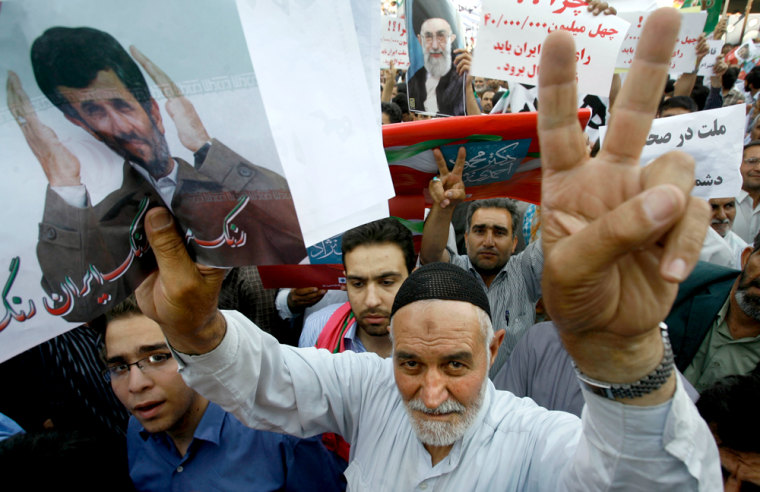U.S. intelligence analysts assessing the situation in Iran believe that while there is potential for a wider upheaval, the nation is not on the brink of revolution, according to a senior U.S. official with access to the reports.
“They’re not certain (Iran is) there yet,” said the official, who spoke on condition of anonymity, when asked if the intelligence community believes Iran is in a “pre-revolutionary” state — a term for the chaos immediately preceding the toppling of a government.
“That doesn’t mean they (the Iranian power structure) can’t mishandle it and make it worse,” the official said. “In fact, they already have.”
Intelligence analysts have been working overtime to determine the seriousness of the events in Iran that have followed Friday’s presidential election and to feed assessments to the White House, the State Department and other agencies.
The Obama administration has not accused Iranian President Mahmoud Ahmadinejad and his backers of stealing the election — in part because it knows the U.S. will have to deal with him if he survives the current turmoil, the official said. But the cautious U.S. stance also springs from intelligence indicating that Ahmadinejad is in a stronger position than video emerging from Tehran would suggest, the official said.
‘Tehran is ... not Iran’
“Tehran is Tehran,” said the official, “but it’s not Iran, and it is not outside the realm of possibility that Ahmadinejad won this election.”
What is not in dispute, according to the official, is that Ahmadinejad and the ruling religious elite have already misplayed their hand.
“It was not a smart play to announce the results so quickly, and his (Ahmadinejad’s) comments likening the protesters to ‘weeds’ and their protests to ‘soccer madness’ didn’t help either,” the official said. “In this country, counting paper ballots is time-consuming enough. To have results a couple of hours after the last ballot was cast?”
As for the role of Ayatollah Ali Khamenei, Iran’s supreme ruler, the official said the intelligence does not indicate whether he is wavering in his support for Ahmadinejad or is simply trying to delay and diminish the protests to give Iran’s senior Islamic leadership some breathing room. But the analysts lean toward the latter explanation, the official said.
“He would like it to go away,” said the official. “The system is stressed in different places, but it is not falling apart … and they have more cards to play.”
Will Khamenei play the Guard ‘card’?
One crucial card, according to the analysis, would be to use the Revolutionary Guard, the elite military unit created in large measure to ensure that the Islamic Revolution is not threatened.
“When do they bring in the professionals? When do we see the Revolutionary Guards?” the official said. “All we have seen so far are the volunteers, the militia,” said the official.
Use of the Revolutionary Guard against protesters would indicate that the regime feels more threatened, the official said. But introducing the Guard into an already volatile mix would be highly risky, the official added.
“We don’t get the sense that it’s going to blow, at least not now,” the official said. “It is said Ahmadinejad is a shrewd politician. Now, he and a lot of others will get a chance to prove it.”
